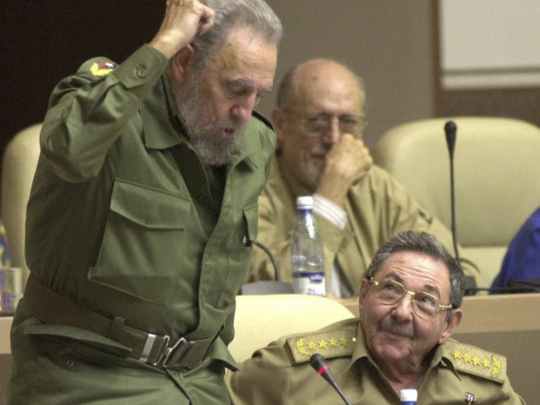
Donald J. Trump has never felt compelled to play by conventional rules — neither in business nor in politics — and that iconoclasm has made him a billionaire and President-elect of the United States. But if he thinks he can use his business practices abroad as a model for negotiations with foreign governments, he will be in for a rude awakening, especially with Cuba. Trump’s foreign business deals have been lucrative, but they exemplify just the sort of cronyism and shady dealing that characterised American business practices in Cuba before late Fidel Castro’s revolution — practices that stoked Cuban nationalism, increased Castro’s popularity and led to the seizure of more than a billion dollars of American property.
In a scene from The Godfather II, Cuba’s dictator, Fulgencio Batista, shows off a solid gold telephone in the presence of American business leaders who gave it to him as thanks for his business-friendly policies. The American-owned Cuban telephone company actually did that in 1957. In another scene, the leaders of stateside crime families partying in Havana cut up a cake topped with icing that reads “Cuba”. That scene was apocryphal, but organised crime did control the Cuban hospitality industry in the 1950s — the hotels, casinos, bars and clubs — along with the associated vices. The police looked the other way and Batista got a piece of the cake.
To Castro and many other Cubans, such behaviour was an affront to national dignity and sovereignty. In 1963, a French reporter quoted former US president John F. Kennedy as having said, in an interview, “Now, we shall have to pay for those sins.”
The bitter memories of those years led Castro to expel American businesses and close down the tourism industry. Yet, this sort of unsavoury collusion between business and government has been routine in Trump’s overseas operations, as the Times has reported. Trump even sent consultants to Cuba in 1998 to investigate a hotel deal, although that violated American economic sanctions.
Will Trump carry his style of doing business into the White House? So far he has been vague about how he will draw a line between his business operations and his presidency. The president-elect fancies himself a deal maker extraordinaire, so there is no reason to think that, as president, he won’t approach negotiations just the way he did as a businessman - tough, blustery, threatening. After all, it worked on the campaign trail.
Castro’s death prompted Trump to reiterate a campaign promise he made: Unless Cuba is willing to negotiate better terms with Washington, he will reverse US President Barack Obama’s policy of engagement. “If Cuba is unwilling to make a better deal for the Cuban people, the Cuban/American people and the US as a whole, I will terminate deal,” he tweeted last Monday.
The US-Cuba relationship that Trump will inherit from Obama is actually not a result of just one deal but a complex fabric of many “deals” — more than a dozen bilateral agreements and a variety of commercial relationships in telecommunications, hospitality, transportation and health care.
What sort of results can Trump expect in a new deal? For two years, diplomatic negotiations between Washington and Havana have advanced at blazing speed, with a dozen new agreements signed — from environmental protection to law-enforcement cooperation against drug traffickers. Cuba is not averse to further talks and is willing to seek common ground. It has even been willing to discuss compensation for American property nationalised in the 1960s and the sensitive issue of human rights.
But sovereignty is something else. Raul Castro, like his brother, has always ruled out negotiating Cuba’s domestic political and economic arrangements. During Obama’s policy of normalisation, Cuba has shown some modest progress on religious freedom, economic liberalisation and even freedom of expression. But those were not results of direct negotiations or demands from Washington. They are byproducts of reduced tensions between the US and Cuba, attributable to engagement itself.
In other words, if Trump’s negotiators pound the table demanding political concessions from Cuba, it won’t get them far. Cubans don’t get scared easily, having survived half a century of plots hatched in the US to overthrow Castro — the Bay of Pigs invasion, the CIA’s secret war, assassination attempts, economic embargo and threats of direct attack. None of that extracted concessions. A US threat to close its embassy or cut off its citizens’ tourist travel won’t work any better.
Trump has enough negotiating experience to realise that both sides must agree to a deal. If he really wants one with Cuba, there are actually several deals to be had — on claims compensation, terms for trade and investment and a plethora of issues of mutual interest.
What he surely won’t get is the kind of sweetheart deals he’s got elsewhere for the Trump Organisation, much as he might still dream of opening a Trump Tower Havana. Cubans have no interest in returning to that sort of crony capitalism. But as president, Trump could close deals that would serve the interests of both the American and Cuban people. A return to hostility, name-calling and bluster as a policy would serve the interests of neither and would be a huge, conspicuous failure of the art of the deal.
— New York Times News Service
William M. LeoGrande, a professor of Government at American University, is a co-author, with Peter Kornbluh, of Back Channel to Cuba: The Hidden History of Negotiations between Washington and Havana.








